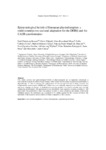Epistemological beliefs of European physiotherapists – a multi-countrycross-cultural adaptation for the DEBQ and the CAEB questionnaires

Ver/
Use este enlace para citar
http://hdl.handle.net/2183/18143Coleccións
- Investigación (FFISIO) [508]
Metadatos
Mostrar o rexistro completo do ítemTítulo
Epistemological beliefs of European physiotherapists – a multi-countrycross-cultural adaptation for the DEBQ and the CAEB questionnairesAutor(es)
Data
2016-09Cita bibliográfica
Beenen PC, Filiputti D, Meyer ER, et al. Epistemological beliefs of European physiotherapists – a multi-countrycross-cultural adaptation for the DEBQ and the CAEB questionnaires. Eur J Physiother. 2017;19(1):1-8
Resumo
[Abstract] This article assumes that epistemological beliefs of physiotherapists are an important determinant in improving the concept of evidence-based practice. Little research has been done on epistemological beliefs in physiotherapy. In order to measure the sophistication of epistemological beliefs in future research, two complementary questionnaires (DEBQ and CAEB) were cross-culturally adapted in nine different countries and seven languages in Europe. A standardized seven-step guideline was used to translate and culturally validate the questionnaires. The questionnaires were distributed in the respective countries, resulting in 1386 participants. The psychometric values were analysed in order to verify consistency and validity. Based on the validation process, the instruments are considered to be validly adapted for the countries involved. The uniformity in the adaptation process allows for future comparison of the countries.
Palabras chave
Cross-cultural adaptation
Evidence-based practice
Epistemological beliefs
Evidence-based practice
Epistemological beliefs
Versión do editor
Dereitos
This is an accepted manuscript of an article published by Taylor & Francis in "European Journal of Physiotherapy", avaliable online at Taylor & Francis Online web page.
ISSN
2167-9177
2167-9169
2167-9169





